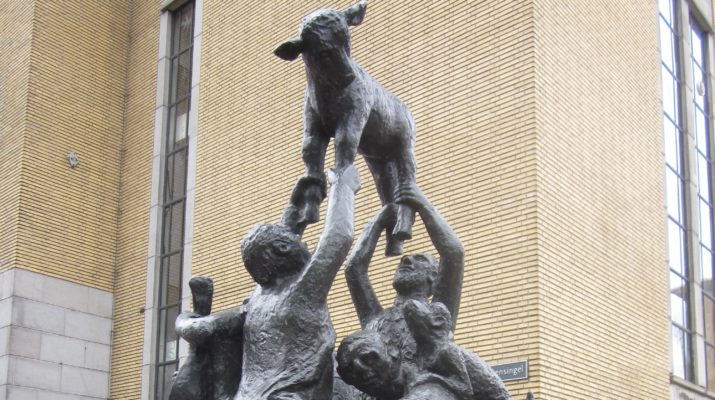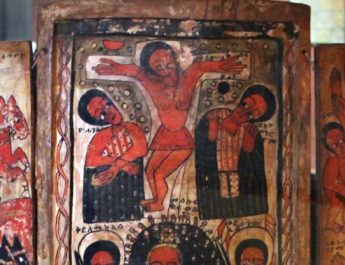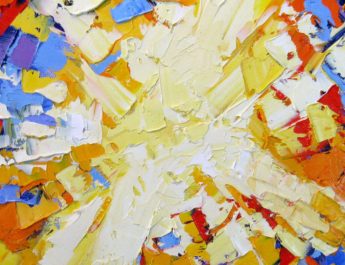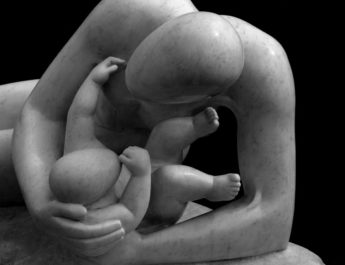Psalm 106:1-6, 19-23
Proper 23A
1 PraiseA the Lord!
O give thanksB to the Lord,C for he is good,D
A “praise” = halal. This is to be clear – it originally referred to a sound, then a color. It was to shine and then make a show or boast then to rave. In a causative sense it came to mean celebrate, give glory, sing praise, or be worth of praise. Because of the celebratory nature of the word, it could also mean to give in marriage. This is where Hallelujah comes from.
B “give thanks” = yadah. From yad (hand). This is to throw one’s hands into the air in a gesture of praise. So, it is to praise, give thanks, or make a confession.
C “Lord” = YHVH. From havah (to be, become) or hayah (to come to pass, become, be). This is the name of the God of Israel, the self-existent and eternal one, the tetragrammaton. This pronunciation has been lost to time so “Lord” is generally used in its place.
D “good” = tob. From tob (to be pleasing, to be good). This is good, beautiful, pleasant, agreeable, bountiful, at ease. This word is used for goodness as a concept, a good thing, a good person. This can refer to prosperity and welfare as well as joy, kindness, sweetness, and graciousness. So, this is ethically good, but also enjoyably good.
for his steadfast loveE endures forever.F
2 Who can utterG the mighty doingsH of the Lord
E “steadfast love” = chesed. From chasad (being good, kind, merciful; may mean bowing one’s neck as is done in the presence of an equal for courtesy’s sake; so, if one in a superior position is treating you like an equal, that is what is captured here). This is favor, goodness, kindness, loving kindness, pity, reproach, or a good deed. When done by God to humanity, this is mercy/loving kindness. When done by humanity to God, it is piety.
F “forever” = olam. This is a long scope of time whether in the past (antiquity, ancient time) or in the future (eternal, everlasting).
G “utter” = malal. 5x in OT. This is to say or speak. It is often used in a poetic sense.
H “mighty doings” = geburah. From gabar (to be strong or mighty; to prevail or be insolent). This is force in a literal or figurative sense. So, it could be strength, power, courage, triumph, victory, or mastery.
I “declare” = shama. This is to hear, call, consent, or consider. It implies listening intelligently, giving attention, and, because of these two factors, obedience and action are often implied.
J “all” = kol. From kalal (to complete). This is all or every.
K “praise” = tehillah. Related to “praise” in v1. From halal (see note A). This is praise or a song of praise. It is to offer God a hymn, to boast in God. This shares a root with “hallelujah.”
3 HappyL are those who observeM justice,N
L “happy” = esher. From ashar (to go straight, lead, guide; to be level and so to be right, blessed, honest, happy). This is happy or blessedness.
M “observe” = shamar. This is to keep, watch, or preserve. It means to guard something or to protect it as a thorny hedge protects something.
N “justice” = mishpat. From shaphat (to judge, defend, pronounce judgment, condemn, govern). This is a verdict or formal sentence whether from humans or from God. It includes the act of judging as well as the place that judging takes place, the suit itself, and the penalty. Abstractly, this is justice, which includes the rights of the participants.
who doO righteousnessP at all times.Q
O “do” = asah. This is to make, do, act, appoint, become in many senses.
P “righteousness” = tsedaqah. From the same as tsedeq (rightness, righteousness, vindication. It is everything that is just or ethical. That which is right in a natural, moral, or legal sense. It also includes just weights (i.e. true weights). Figuratively, this is justice, righteousness, equity – even prosperity). This is righteousness, justice, righteous acts, and moral virtue.
Q “times” = et. Probably from anah (to answer, sing, announce); from ad (forever, all, old); from adah (to pass on, advance, decorate oneself). This is a period or season. It can also mean whenever or continually.
4 RememberR us, O Lord, when you show favorS to your people;T
helpU us when you deliverV them,
R “remember” = zakar. This is to remember, to mark something so that it can be recalled, to be mindful of, to mention.
S “favor” = ratson. From ratsah (to be pleased with, delight, take pleasure in, or accept with favor; to approve or consent regarding something; can be used specifically of satisfying debts or being pardoned). This is delight shown in favor, good will, something that is accepted or acceptable.
T “people” = am. From amam (to darken, hide, associate; creating shadows by huddling together). This is people or nation. It can be used specifically for a tribe, collectively of troops or armies, or figuratively to refer to a flock of animals.
U “help” = paqad. This is to attend to or visit – can be used for a friendly or violent encounter. So, it can be to oversee, care for, avenge, or charge.
V “deliver” = yeshuah. From yasha (to deliver, defend, help, preserve, rescue, be safe. Properly, to be open, wide or free, which implies being safe. Used causatively, it means to free). This is salvation, deliverance, health, victory, prosperity.
5 that we may seeW the prosperityX of your chosen ones,Y
that we may rejoiceZ in the gladnessAA of your nation,BB
W “see” = raah. This is to see in a literal or figurative sense so stare, advise, think, view.
X “prosperity” = tob. Same as “good” in v1. See note D above.
Y “chosen ones” = bachir. From bachar (to choose, appoint, try, excellent). This is chosen or choice. So, it implies excellence.
Z “rejoice” = samach. This is to rejoice or be glad. Properly, it is to brighten up in a literal or figurative sense.
AA “gladness” = simchah. Related to “rejoice” in v5. From samach (see note Z above). This is joy, rejoicing, pleasure, or glee.
BB “nation” = goy. From the same root as gevah (the back, person, or body); related to gev (among); related to gaah (to rise up). This is nation or people. Often used to refer to Gentiles or foreign nations. It can also be used figuratively for a group of animals. This is where the Yiddish “goy” comes from.
that we may gloryCC in your heritage.DD
6 Both we and our ancestorsEE have sinned;FF
we have committed iniquity,GG have done wickedly.HH
CC “glory” = halal. Same as “praise” in v1. See note A above.
DD “heritage” = nachalah. Related to nachal (to inherit, occupy, distribute, take as heritage). This is properly something that was inherited. It can mean occupancy generally or, more particularly, an heirloom or an estate. This can be an inheritance, gift, possession, or portion.
EE “ancestors” = ab. This is father, chief, or ancestor. It is father in a literal or figurative sense.
FF “sinned” = chata. This is properly to miss, and so figuratively it is used for sinning, bearing the blame. It implies a forfeiture or loss of something.
GG “committed iniquity” = avah. 17x in OT. This is to bend, turn, be crooked in a literal or figurative sense. So, it can refer to committing iniquity.
HH “done wickedly” = rasha. From resha (wrong, particularly moral wrong; wickedness, evil, wicked deeds, or something that is ill-gotten). This is to be or do something wicked, condemn, give punishment, vex, disturb, or violate.
19 They madeII a calfJJ at HorebKK
and worshipedLL a cast image.MM
II “made” = asah. Same as “do” in v3. See note O above.
JJ “calf” = egel. May be from the same as agol (round, circular – root meaning revolve). This is a male calf as one that frisks about. Often used for one that is almost grown up. This is also the word used for the molten calf in Ex 32.
KK “Horeb” = Choreb. 17x in OT. From chareb (to devastate, desolate, or be waste). Horeb means waste or desolate.
LL “worshiped” = shachah. This is to bow down, make a humble entreaty, to do homage to royalty or to God.
MM “cast image” = massekah. From nasak (to cover, pour out, offer; by analogy anointing a king). This is a pouring out or over. So it could be pouring molten metal to cast an image, making a libation (pouring out a drink offering), or otherwise covering.
20 They exchangedNN the gloryOO of God
for the imagePP of an oxQQ that eatsRR grass.SS
NN “exchanged” = mur. 15x in OT. This is to change, substitute, stand by, alter, remove.
OO “glory” = kabod. From kabad (to be heavy, weighty, burdensome). This is weighty. Figuratively, glorious, abundant, riches, honor, splendor – a reference to one’s reputation or character. This word is often used to describe God and God’s presence.
PP “image” = tabnith. From banah (to build, make, set up, obtain children; to build literally or figuratively). This is a structure, model, figure, image, or resemblance.
QQ “ox” = shor. Perhaps from shur (to travel, turn, journey; travelling like a prostitute or a merchant). This is bull, ox, head of cattle, cow.
RR “eats” = akal. This is to eat, devour, burn up, or otherwise consume. It can be eating in a literal or figurative sense.
SS “grass” = eseb. Root may mean to be green or to glisten. This is grass or some other tender shoot.
21 They forgotTT God,UU their Savior,VV
who had done great thingsWW in Egypt,XX
TT “forgot” = shakach. This is to forget because of not remembering something or not paying attention to it. It can also mean to mislay.
UU “God” = El. This is God or a god.
VV “Savior” = yasha. Related to “deliver” in v4. See note V above.
WW “great things” = gadol. From gadal (to grow up, become great, become wealthy – to advance. The root meaning may be to twist in the sense of the process of growing). This is great, high, bigger, noble, old, marvelous. It can also refer to someone who is powerful or distinguished.
XX “Egypt” = Mitsrayim. Perhaps from matsor (besieged or fortified place, bulwark, entrenchment; something hemmed in; a siege or distress or fastness); from tsur (to confine, besiege, to cramp). This is Egypt.
22 wondrous worksYY in the landZZ of Ham,AAA
YY “wondrous works” = pala. From pele (wonder, miracle, wonderful, marvelous thing). This is to be extraordinary, to arise, to be great or accomplish.
ZZ “land” = erets. Root may mean to be firm. This is earth, ground, field land, or country.
AAA “Ham” = Cham. 16x in OT. Perhaps from the same as cham (hot, warm); from chamam (to be warm, heat; to be hot in a literal or figurative sense; to mate). This is Ham, meaning “hot” or “protective wall.” See https://www.abarim-publications.com/Meaning/Ham.html
and awesome deedsBBB by the RedCCC Sea.DDD
23 Therefore he said he would destroyEEE them—
had not Moses,FFF his chosen one,
BBB “awesome deeds” = yare. This is to fear, be afraid, dreadful. It can also refer to fearful reverence – to fear in a moral sense is to say to revere, respect.
CCC “Red” = suph. Perhaps from Egyptian twfi (reeds). This is reeds or rushes. It can be used particularly to refer to papyrus, or a flag. This is https://www.abarim-publications.com/Dictionary/sa/sa-p-pfin.html#.XzHCuChKhPY
DDD “Sea” = yam. Root may mean to roar. This is the sea, often referring to the Mediterranean. It comes from the root in the sense of the roar of crashing surf. This word is sometimes used for rivers or other sources of water. It can mean to the west or to the south.
EEE “destroy” = shamad. This is to demolish, destroy, perish, overthrow, pluck down.
FFF “Moses” = Mosheh. From mashah (to pull out in a literal or figurative sense, to draw out) OR from Egyptian mes or mesu (child, son i.e. child of…). This is Moses – the one drawn out from the water, which is to say, rescued. If derived from the Egyptian, his name would share a root with Rameses and Thutmose.
stoodGGG in the breachHHH beforeIII him,
GGG “stood” = amad. This is to stand up in a literal or figurative sense. So it can be establish, continue, endure, take a stand, act, be a servant, stand still, remain, stand against an enemy.
HHH “breach” = perets. 19x in OT. From parats (to make a breach, burst out, compel, disperse; to break out literally or figuratively). This is a breach or a gap. It could be a break, whether literal or figurative.
III “before” = paneh. From panah (to turn, face, appear). This is face in a literal or figurative sense. It could be face, presence, anger, respect. It can also be used of God to indicate divine favor or presence.
to turn awayJJJ his wrathKKK from destroyingLLL them.
JJJ “turn away” = shub. To turn back, return, turn away – literally or figuratively. Doesn’t necessarily imply going back to where you started from. This is also the root verb for the Hebrew word for repentance “teshubah.”
KKK “wrath” = chemah. From yacham (to be hot, mate; figuratively, to conceive). This is heat – figuratively it can be anger or fury. It can also refer to poison or venom as they can cause fever.
LLL “destroying” = shachath. This is to go to ruin, perish, decay, batter, cast off, lose, one who destroys. This can be used in a literal or figurative sense.
Image credit: “Dancing around the Golden Calf” by Fri Heil, 1976.




